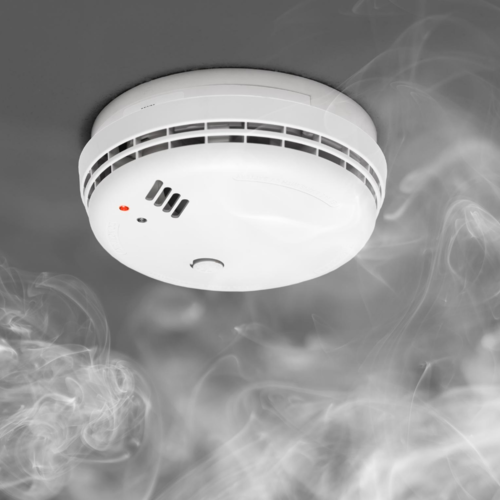As I mentioned last week, once you’ve lived in a house for a while, little details often become invisible, which is why annual safety audits are such a good idea. Here’s a continuation of last week’s checklist to keep your home safe and in good repair.
Kitchen Fire Extinguishers
To keep everyone safe in the kitchen, it’s important to have a fire extinguisher that can put out grease fires; not all of them can. You want an “ABC” extinguisher, or any extinguisher that includes “B” (those are the ones that put out oil and grease fires). It’s best not to store it under the kitchen sink behind years’ worth of cleaning supplies, which is where the vast majority live. I know they aren’t the most attractive implements, but it is wiser to store them near a kitchen exit mounted on the wall about where everyone can see and reach it. That way, they are handy when you need them, and you do not need to move closer to the fire to get access to the extinguisher.
During your safety audit, check the expiration date on the extinguisher, make sure the pressure gauge is in the green zone and the pin is firmly in place, and check for any visible leaks or rust. If you’ve never used one, remember the acronym PASS, which stands for Pull the pin, Aim at the base of the fire, Squeeze the extinguisher slowly, and Sweep the nozzle back and forth across the fire. Be aware, there’s a special technique to use if the fire is spreading rapidly. It’s called the drop-the-extinguisher-and-run technique. Get out of there and call the fire department once you’re at a safe distance.
Water Heaters
Another out-of-the-way fixture that’s easy to ignore unless something goes wrong is your water heater. During your safety audit, the most important thing to check is your water heater’s pop-off safety valve. In the event that your water heater malfunctions and overheats, the safety valve releases pressure. The valve should be attached to a pipe that will route scalding steam down and away from innocent passersby. If you want to see what happens when the valve isn’t working, Google “Myth Busters Episode 89: Exploding Water Heater.”
In the olden days, people used to recommend wrapping your water heater with a special blanket to improve efficiency. If you do so now, you’ll not only make the heater less efficient, you’ll void the warranty. What you should check is that the water heater is not sitting on the garage floor, but on an elevated step, ideally in a smitty pan. A smitty pan is a shallow three-foot pan attached to a hose that routes water outside, should the need arise. You’d be amazed how quickly water from a leaky heater can soak everything in its path.
A final note on water heaters: most of us do not need to keep them at 130 degrees. If you lower the heat to 120 degrees, you can save about $10 per month without noticing a difference in your water temperature. It will simply reduce that chance of anyone getting burned.
Furnace and Air Conditioners
Speaking of heaters, you should check the filter on your furnace once a month, including during your annual safety audit. If it’s clogged, replace it. Same goes for your air conditioner. Clogged or missing filters can take years off your HVAC system. And if you have a fireplace or wood burning stove, have the chimney cleaned once a year.
Wells and Sump Pumps
Finally, if you depend on a well for water or a sump pump to keep things dry, check them during your annual audit. Make sure wells have no visible cracks or signs of corrosion. If water tastes or looks funny, don’t wait for your annual safety audit. Get a water sample and take it to Alpha Labs in Ukiah to make sure it’s safe to drink. As for sump pumps, be sure to check it before the rainy season so it’s ready and waiting when the first storm hits.
If you have questions about property management or real estate, please contact me at [email protected] or call (707) 462-4000. If you have an idea for a future column, share it with me and if I use it, I’ll send you a $25 gift certificate to Schat’s Bakery. To see previous articles, visit www.selzerrealty.com and click on “How’s the Market”.
Dick Selzer is a real estate broker who has been in the business for more than 40 years.


